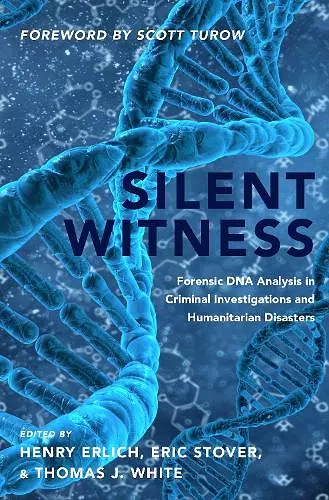Silent Witness
Forensic DNA Evidence in Criminal Investigations and Humanitarian Disasters
Henry Erlich editor Eric Stover editor Thomas J White editor
Format:Hardback
Publisher:Oxford University Press Inc
Published:19th Nov '20
Currently unavailable, and unfortunately no date known when it will be back
This hardback is available in another edition too:
- Paperback£30.99(9780190909451)

Since its introduction in the late 1980s, DNA analysis has revolutionized the forensic sciences: it has helped to convict the guilty, exonerate the wrongfully convicted, identify victims of mass atrocities, and reunite families whose members have been separated by war and repressive regimes. Yet, many of the scientific, legal, societal, and ethical concepts that underpin forensic DNA analysis remain poorly understood, and their application often controversial. Told by over twenty experts in genetics, law, and social science, Silent Witness relates the history and development of modern DNA forensics and its application in both the courtroom and humanitarian settings. Across three thematic sections, Silent Witness tracks the scientific advances in DNA analysis and how these developments have affected criminal and social justice, whether through the arrests of new suspects, as in the case of the Golden State Killer, or through the ability to identify victims of war, terrorism, and human rights abuses, as in the cases of the disappeared in Argentina and the former Yugoslavia and those who perished during the 9/11 attacks. By providing a critical inquiry into modern forensic DNA science, Silent Witness underscores the need to balance the benefits of using forensic genetics to solve crime with the democratic right to safeguard against privacy invasion and unwarranted government scrutiny, and raises the question of what it means to be an autonomous individual in a world where the most personal elements of one's identity are now publicly accessible.
There are many books on the science of forensic DNA profiling. There are many books on the legal issues its raises. There are none as comprehensive and effective as Silent Witness in bringing together the thoughts of leading scientists, lawyers, and other researchers on the history of this revolutionary forensic science, the most recent advances and applications, and the ethical and policy issues it poses across the globe. * David Kaye, Distinguished Professor Emeritus, The Pennsylvania State University, and Regents' Professor Emeritus, Arizona State University *
This book traces the history of the fascinating forensic DNA technology and provides a comprehensive discussion of the many issues raised by it — the science, ethics, privacy, and many more. It is an essential book for students and scholars and indeed for the interested layperson. * Richard J. Goldstone, former Chief Prosecutor of the ICTY and ICTR and retired Justice of the Constitutional Court of South Africa *
This book is a great additional to the tool kit all of us have who seek truth and justice, whichever side of the courtroom we call home. * Brenda Hollis, Brenda Hollis, Consultant, International Criminal Law and Procedure, former Chief Prosecutor SCSL/RSCSL *
This remarkable text brings together experts — from academia and the field — to share their knowledge of the science, law, and ethics around the use of emergent DNA technologies to bring justice, social repair, and closure in the wake of genocide, conflict and other humanitarian crises, including on the U.S. border. This book is essential reading for anyone interested in exploring the intersection of science and criminal justice, transitional justice, and peace-building. * Beth Van Schaack, Leah Kaplan Visiting Professor of Human Rights, Stanford Law School and Faculty Affiliate, Stanford Center for Human Rights & International Justice *
ISBN: 9780190909444
Dimensions: 241mm x 159mm x 27mm
Weight: 708g
412 pages